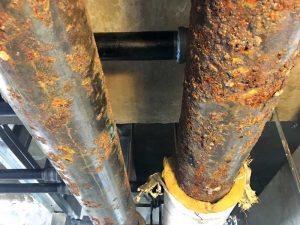Corrosion under insulation (CUI) of steel chilled water pipe

Steel pipe in chilled water applications is susceptible to corrosion from surface condensation in a humid environment. Pipe insulation is used on chilled water pipe to minimize thermal transfer between the pipe and the ambient environment, and to inhibit condensation of water vapor on the pipe surface that can lead to accelerated corrosion of steel pipe—a mechanism known as corrosion under insulation (CUI).
To prevent CUI, pipe insulation is installed with a moisture retarding cover, and insulation joints and seams must be carefully sealed with approved tape to form a competent vapor barrier that inhibits the intrusion of moisture-laden air to the pipe surface. Correctly installed insulation with an intact vapor barrier will protect chilled water pipe from CUI for many years of service (Photo 8). Unfortunately, in their inspection of plumbing systems, the authors’ company frequently encounters pipe where the insulation vapor barrier has been compromised due to poor installation or damage from adjacent construction (Photo 9), resulting in failures from CUI (Photo 10).
Since plumbing pipe and other utilities are often installed in tight spaces, inadvertent damage during construction or renovations can occur. It is important that, when all construction is complete, insulated plumbing pipe is inspected to ensure the integrity of the insulation vapor barrier has not been compromised.
Conclusion
Properly designed and installed plumbing pipe should not experience significant corrosion for the anticipated service life of the system. However, actions during the construction or renovation of a building can alter the environment of these systems, resulting in unanticipated and costly corrosion problems. Any construction activities that could impact a plumbing system should be properly assessed to preclude premature corrosion failure.



 Alan Humphreys is a staff consultant and metallurgist in the engineering mechanics and infrastructure group at Simpson Gumpertz & Heger. He specializes in the failure analysis and structural assessment of materials systems which have degraded by mechanisms such as corrosion, fracture/fatigue, or wear. Humphreys can be reached at aohumphreys@sgh.com.
Alan Humphreys is a staff consultant and metallurgist in the engineering mechanics and infrastructure group at Simpson Gumpertz & Heger. He specializes in the failure analysis and structural assessment of materials systems which have degraded by mechanisms such as corrosion, fracture/fatigue, or wear. Humphreys can be reached at aohumphreys@sgh.com. Phillip Sharff is a principal at Simpson Gumpertz & Heger. He specializes in the performance of underground structures, piping systems, building and mechanical components, industrial structures, tanks, and structural materials. He has led many failure investigations of buried structures, building components, piping, and structural plastics materials, often involving forensic field studies, laboratory testing programs, structural analysis, and expert testimony. Sharff can be reached at pasharff@sgh.com.
Phillip Sharff is a principal at Simpson Gumpertz & Heger. He specializes in the performance of underground structures, piping systems, building and mechanical components, industrial structures, tanks, and structural materials. He has led many failure investigations of buried structures, building components, piping, and structural plastics materials, often involving forensic field studies, laboratory testing programs, structural analysis, and expert testimony. Sharff can be reached at pasharff@sgh.com.
